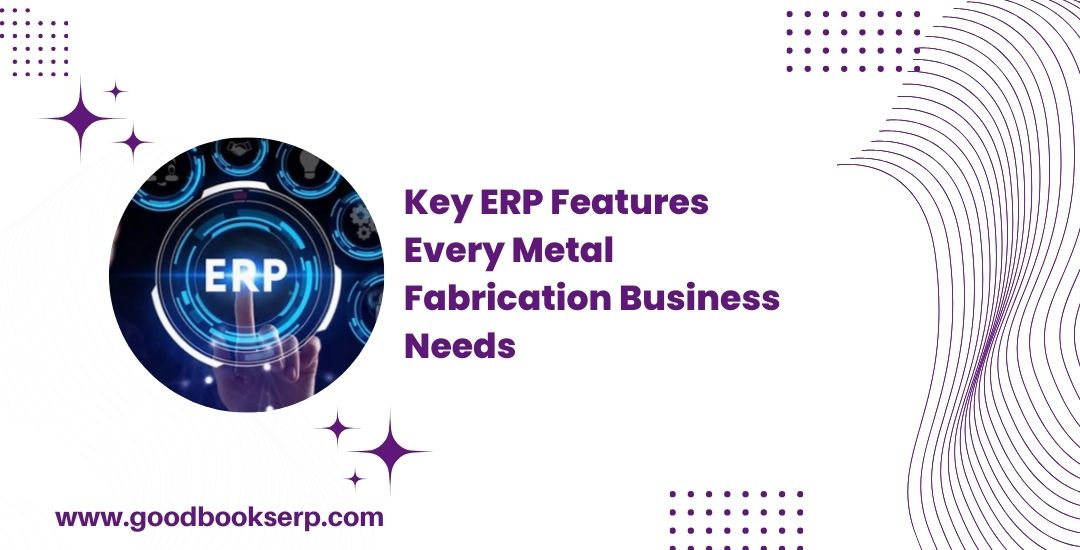Choosing the Right ERP Software for Your Business
The metal fabrication industry faces unique challenges that require specialized tools and processes to ensure efficiency, quality, and cost-effectiveness. Implementing an ERP software tailored to the specific needs of metal fabricators can significantly improve operations.
12 Key ERP Features every Metal Fabricators Needs
Here are the top 12 ERP features essential for the metal fabrication industry:
1. Project Management
Effective project management is crucial for metal fabrication businesses, where projects often involve complex, multi-step processes. An ERP system with robust project management capabilities helps you plan, execute, and monitor all aspects of a project, from initial design to final delivery. It ensures that projects stay on track, deadlines are met, and resources are optimally utilized.
2. Estimation & Quotations
Accurate estimations and quotations are vital for winning contracts and maintaining profitability. ERP systems provide tools to generate precise cost estimates based on materials, labor, and overheads. This feature helps you create competitive and reliable quotes, increasing your chances of securing new business while ensuring you remain profitable.
3. Job Costing
Job costing features in ERP systems allow you to track and analyze the costs associated with each job or project. This includes labor, materials, and other expenses. By having detailed cost information, you can identify areas where efficiencies can be gained and ensure that projects are completed within budget.
4. Bill of Materials (BOM)
The Bill of Materials (BOM) is a comprehensive list of materials, components, and assemblies required to manufacture a product. ERP systems with BOM capabilities help you manage this critical information, ensuring that you have all necessary materials on hand and reducing the risk of production delays.
5. Material Requirements Planning (MRP)
Material Requirements Planning (MRP) is essential for ensuring that the right materials are available at the right time. ERP systems with MRP functionality help you plan and schedule material purchases based on production needs, minimizing inventory costs and reducing the risk of stockouts.
6. Nesting Process
The nesting process involves arranging parts to be cut from raw materials in the most efficient manner to minimize waste. An ERP system with nesting capabilities optimizes this process, reducing material waste and lowering costs. This feature is particularly important in the metal fabrication industry, where material costs can be significant.
7. Routing Management
Routing management involves planning the sequence of operations required to manufacture a product. ERP systems help you define and manage these routes, ensuring that each step is completed in the correct order and optimizing the flow of production.
8. Job Scheduling
Job scheduling is critical for ensuring that production processes run smoothly and efficiently. ERP systems with job scheduling capabilities allow you to allocate resources, plan work orders, and manage production timelines effectively. This helps you meet deadlines and improve overall productivity.
9. Shop Floor Control
Shop floor control features in ERP systems provide real-time visibility into production activities. This includes tracking the status of work orders, monitoring machine performance, and managing labor resources. With this information, you can make informed decisions to optimize shop floor operations and address any issues promptly.
10. Production Tracking
Production tracking allows you to monitor the progress of manufacturing jobs in real-time. ERP systems provide tools to track the status of each job, from initial order to final delivery. This helps you identify bottlenecks, manage workflow, and ensure that projects are completed on time.
11. Quality Control
Maintaining high quality standards is essential in the metal fabrication industry. ERP systems with quality control features help you implement rigorous quality checks at various stages of production. This includes tracking defects, managing inspections, and ensuring compliance with industry standards, resulting in higher quality products and reduced rework costs.
12. Inventory Management
Effective inventory management is crucial for minimizing costs and ensuring that materials are available when needed. ERP systems provide real-time inventory tracking, allowing you to manage stock levels, track material usage, and optimize inventory turnover. This helps reduce carrying costs and prevent production delays due to material shortages.
Conclusion
Implementing an ERP system with these essential features can significantly enhance the efficiency and profitability of metal fabrication operations. From project management and job costing to quality control and inventory management, each feature addresses a specific aspect of the manufacturing process, helping you streamline operations and achieve better results. By choosing an ERP system tailored to the needs of the metal fabrication industry, you can overcome common challenges and position your business for long-term success.

